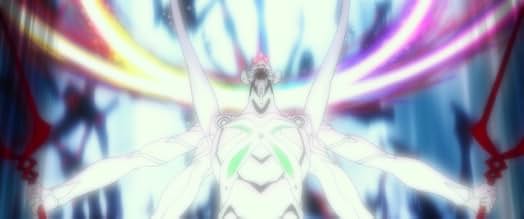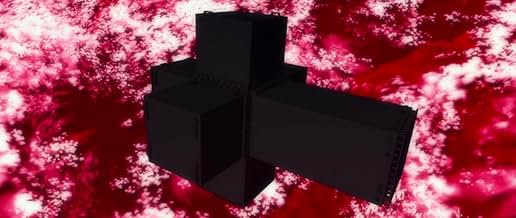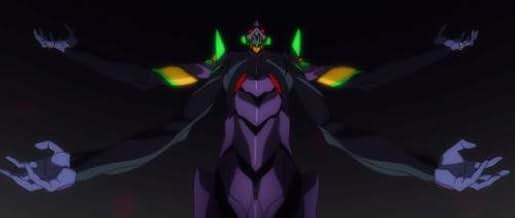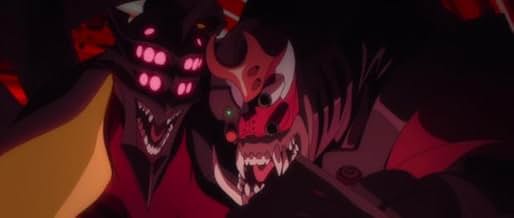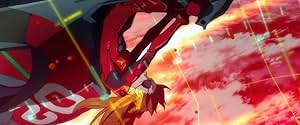NOTE IMDb
6,9/10
20 k
MA NOTE
Quatorze ans se sont écoulés depuis le presque troisième impact. La plupart du monde a changé sauf Shinji Ikari qui s'éveille, sans âge, dans un environnement nouveau et étrange. Misato a fo... Tout lireQuatorze ans se sont écoulés depuis le presque troisième impact. La plupart du monde a changé sauf Shinji Ikari qui s'éveille, sans âge, dans un environnement nouveau et étrange. Misato a formé un groupe qui est séparé de Nerv.Quatorze ans se sont écoulés depuis le presque troisième impact. La plupart du monde a changé sauf Shinji Ikari qui s'éveille, sans âge, dans un environnement nouveau et étrange. Misato a formé un groupe qui est séparé de Nerv.
- Récompenses
- 2 nominations au total
Megumi Ogata
- Shinji Ikari
- (voix)
Hiro Yûki
- Makoto Hyuga
- (voix)
Miki Nagasawa
- Maya Ibuki
- (voix)
Akio Ôtsuka
- Kouji Takao
- (voix)
Anri Katsu
- Hideki Tama
- (voix)
Mugihito
- Keel Lorenz
- (voix)
Avis à la une
It's great that they finally tried to do something a little different, but here we are missing everything that made the franchise special or the first two films remotely good. We are at a point in the story where the focus should be finally moved to the characters, but most of them have been suddenly cut out or turned into something completely different. The personalities of the ones who are still around have been strangely flattened, with important issues often being resolved in a short conversation if not a casual shogi game (??). On the other hand, things that should be kept simple are made overcomplicated with no apparent purpose. I dare anyone who is not familiar with the series to understand the point of this film.
Shinji's struggle mostly came from the inside, but this time they decided to let the world end earlier so that he could have something extra to whine about for a couple of hours. I was initially pleased to find out that the film would be focused on the relationship between him and Kaworu, as the original series only spends 15 minutes on it. Still, it felt like they could develop that aspect a little more as well. Maybe they spent too much time working on the (boring) CGI action sequences to make people happy.
I am confident that "3.0+1.0 Thrice Upon a Time" will be better, but as this is no TV show, each individual film should be satisfying with its own definite narrative arc.
Shinji's struggle mostly came from the inside, but this time they decided to let the world end earlier so that he could have something extra to whine about for a couple of hours. I was initially pleased to find out that the film would be focused on the relationship between him and Kaworu, as the original series only spends 15 minutes on it. Still, it felt like they could develop that aspect a little more as well. Maybe they spent too much time working on the (boring) CGI action sequences to make people happy.
I am confident that "3.0+1.0 Thrice Upon a Time" will be better, but as this is no TV show, each individual film should be satisfying with its own definite narrative arc.
The Rebuild saga blazes onward in Anno's world flipping master act. This is the world of Evangelion unlike anything that's been done before, boasting a new, clear and confident vision that brings our heroes and anti-heroes through endless strife and the most horrific of imaginable emotional confrontations. At times it's hard to watch for that reason, but the fact that an 'out' even exists, in all of its mysterious grandeur, shows us that this doesn't have to be the end
and it's already gone beyond THE End that we've previously been met with.
Atmosphere is what the entire movie is about. Dialogue is minimal, and much is left to the visuals to tell the story of the Fourth Impact. Those visuals are quite unlike much else I've seen in a film, carrying on Evangelion's hellish, dreamlike tradition of an original, complex, and thought-provoking art direction. The cryptic nature of every artistic level, be it writing, animation, design, or music cues, that the feature works on, recalls once again, the work of Stanley Kubrick and his 'Kubrick's Cube' of visual parallelism. Aside for some visual nods to Kubrick's work (2001: A Space Odyssey, in particular), Hideaki Anno produces a visual wonder through animation, as he has with the previous Evangelion entries (and the parallels between NGE and Rebuild, in their universe hand-offs, progressions, and quantum entanglements), and goes above and beyond. It's truly a masterpiece worthy of seemingly endless dissection.
One shot that stands out in particular for me is Shinji, listening to his Walkman in the foetal position in the ruins of NERV HQ as the green grass that has grown through the oppressive concrete floor over time rustles softly in the wind. It's melancholic and establishes the feeling of the film's middle act- its heart. Between that is the confusion of being in Shinji's shoes and facing a world fourteen years passes, for what is mere moments for him. It is effectively soul-crushing, driving one to desire a brighter future for all who still live on the Earth; but there's no way it will ever be reached without a battle hard-fought.
This is much the story of two particular characters, Shinji and Kaworu than the others and while at times that can feel disappointing, to recognize the importance of the plot's gaze is essential to understanding where the Rebuild is going. For every time I crave more of Mistato's development or an appearance from Kaji, the look back toward Shinji and Kaworu is ultimately as fulfilling. Visually, the movie presents so much to analyze and merely take in, that I feel we'll have enough to puzzle over right up until 4.0— Final. It's an absolute beauty, and to watch it in anything less than high definition is more than a disservice.
As if the startling premise wasn't enough of a radical change, the final 20 or so minutes takes Evangelion to unheard of heights and, in some cases, lows. These are the best kinds of each.
Though I can understand the dislike for this movie from fans of Evangelion, I urge them to look back upon it with eyes and a mind free of expectations and see it as something that isn't meant to be the Evangelion we know- the point of the movie is to venture into the unknown, not follow the path we've seen in Neon Genesis; from the end of 2.22, it would seem this was made clear.
It's new, it's mysterious, and quickly advancing toward a new ending that could be the end of all things, the breaking of the cycle that we've been experiencing for the past 18 years, across anime, manga, and feature film. But what is the element that Shinji must perform to finally defy every quantifiable expectation? Let's see what Mr. Anno has to present him.
"Everybody finds love in the end..."
Atmosphere is what the entire movie is about. Dialogue is minimal, and much is left to the visuals to tell the story of the Fourth Impact. Those visuals are quite unlike much else I've seen in a film, carrying on Evangelion's hellish, dreamlike tradition of an original, complex, and thought-provoking art direction. The cryptic nature of every artistic level, be it writing, animation, design, or music cues, that the feature works on, recalls once again, the work of Stanley Kubrick and his 'Kubrick's Cube' of visual parallelism. Aside for some visual nods to Kubrick's work (2001: A Space Odyssey, in particular), Hideaki Anno produces a visual wonder through animation, as he has with the previous Evangelion entries (and the parallels between NGE and Rebuild, in their universe hand-offs, progressions, and quantum entanglements), and goes above and beyond. It's truly a masterpiece worthy of seemingly endless dissection.
One shot that stands out in particular for me is Shinji, listening to his Walkman in the foetal position in the ruins of NERV HQ as the green grass that has grown through the oppressive concrete floor over time rustles softly in the wind. It's melancholic and establishes the feeling of the film's middle act- its heart. Between that is the confusion of being in Shinji's shoes and facing a world fourteen years passes, for what is mere moments for him. It is effectively soul-crushing, driving one to desire a brighter future for all who still live on the Earth; but there's no way it will ever be reached without a battle hard-fought.
This is much the story of two particular characters, Shinji and Kaworu than the others and while at times that can feel disappointing, to recognize the importance of the plot's gaze is essential to understanding where the Rebuild is going. For every time I crave more of Mistato's development or an appearance from Kaji, the look back toward Shinji and Kaworu is ultimately as fulfilling. Visually, the movie presents so much to analyze and merely take in, that I feel we'll have enough to puzzle over right up until 4.0— Final. It's an absolute beauty, and to watch it in anything less than high definition is more than a disservice.
As if the startling premise wasn't enough of a radical change, the final 20 or so minutes takes Evangelion to unheard of heights and, in some cases, lows. These are the best kinds of each.
Though I can understand the dislike for this movie from fans of Evangelion, I urge them to look back upon it with eyes and a mind free of expectations and see it as something that isn't meant to be the Evangelion we know- the point of the movie is to venture into the unknown, not follow the path we've seen in Neon Genesis; from the end of 2.22, it would seem this was made clear.
It's new, it's mysterious, and quickly advancing toward a new ending that could be the end of all things, the breaking of the cycle that we've been experiencing for the past 18 years, across anime, manga, and feature film. But what is the element that Shinji must perform to finally defy every quantifiable expectation? Let's see what Mr. Anno has to present him.
"Everybody finds love in the end..."
This film loses all the momentum of the first two installments. It takes an interesting arc and just devolves into a bunch of empty moments. Before, there was intense drama and stakes serving a wider plot. Here it just feels forced. Everyone hates Shinji, sure, but it never seems convincing or meaningful.
Finally new material after years of remakes and recycled material and reshuffled scenes.
It is glorious to behold!
But, at the same time, it was a whole lot of setup and build up for the final part in the series. So, it didn't have as much bang as I would have liked.
Overall, it's very true to what came before, and it's nice to see these characters doing something new even if it was a bit of a tease to wait for the final movie.
It is glorious to behold!
But, at the same time, it was a whole lot of setup and build up for the final part in the series. So, it didn't have as much bang as I would have liked.
Overall, it's very true to what came before, and it's nice to see these characters doing something new even if it was a bit of a tease to wait for the final movie.
10dedrew0
"Evangelion is like a puzzle, you know. Any person can see it and give his/her own answer. In other words, we're offering viewers to think by themselves, so that each person can imagine his/her own world. We will never offer the answers, even in the theatrical version. As for many Evangelion viewers, they may expect us to provide the 'all-about Eva' manuals, but there is no such thing. Don't expect to get answers by someone. Don't expect to be catered to all the time. We all have to find our own answers." - Hideaki Anno
End of Evangelion released on July 19th, 1997 in Japan Evangelion 3.33 released on November 17th, 2012 in Japan.
The story of 3.33 begins 14 years after 2.22's conclusion. Ultimately, the plot does not matter. The story was never meant to be about the lore, or the EVAs, or the Angels. The story is one of Japanese society, and those who reject society and seek ways to escape their lives. 2.22 was an idealised version of the original series by the fans, and in Eva's irony, Eva's characters have become caricatures on which Otaku and Hikikomori can escape reality, Rei in particular. 3.33 is Anno talking to the audience.
End of Evangelion released on July 19th, 1997 in Japan Evangelion 3.33 released on November 17th, 2012 in Japan.
The story of 3.33 begins 14 years after 2.22's conclusion. Ultimately, the plot does not matter. The story was never meant to be about the lore, or the EVAs, or the Angels. The story is one of Japanese society, and those who reject society and seek ways to escape their lives. 2.22 was an idealised version of the original series by the fans, and in Eva's irony, Eva's characters have become caricatures on which Otaku and Hikikomori can escape reality, Rei in particular. 3.33 is Anno talking to the audience.
Le saviez-vous
- AnecdotesThe post-credits preview for the next film, featuring EVA Unit 8+2 fighting, was created by motion capturing stuntmen rather than traditional animation.
- GaffesDuring the scene when Rei attacks Wunder, there is a close up shot of Shinji screaming, during the close up we didn't see his collar attached to his neck, however, after a flash of explosion, the collar magically appears.
However, this mistake only appears in the home video version.
- Crédits fousUnlike the previous two movies, where the original Japanese title cards showed in the beginning or after the prologue, in 3.0/Q the title card shows up when the film runs 30 minutes of its duration.
However, the English title card still shows up at the halfway point of the movie.
- ConnexionsFeatured in ScrewAttack's Top 10s: Top 10 Piloted Mechs (2017)
Meilleurs choix
Connectez-vous pour évaluer et suivre la liste de favoris afin de recevoir des recommandations personnalisées
Détails
Box-office
- Montant brut aux États-Unis et au Canada
- 174 945 $US
- Week-end de sortie aux États-Unis et au Canada
- 110 825 $US
- 12 janv. 2014
- Montant brut mondial
- 60 648 662 $US
- Durée1 heure 36 minutes
- Couleur
- Mixage
- Rapport de forme
- 2.35 : 1
Contribuer à cette page
Suggérer une modification ou ajouter du contenu manquant

Lacune principale
By what name was Evangelion: 3.0 You Can (Not) Redo (2012) officially released in India in English?
Répondre

